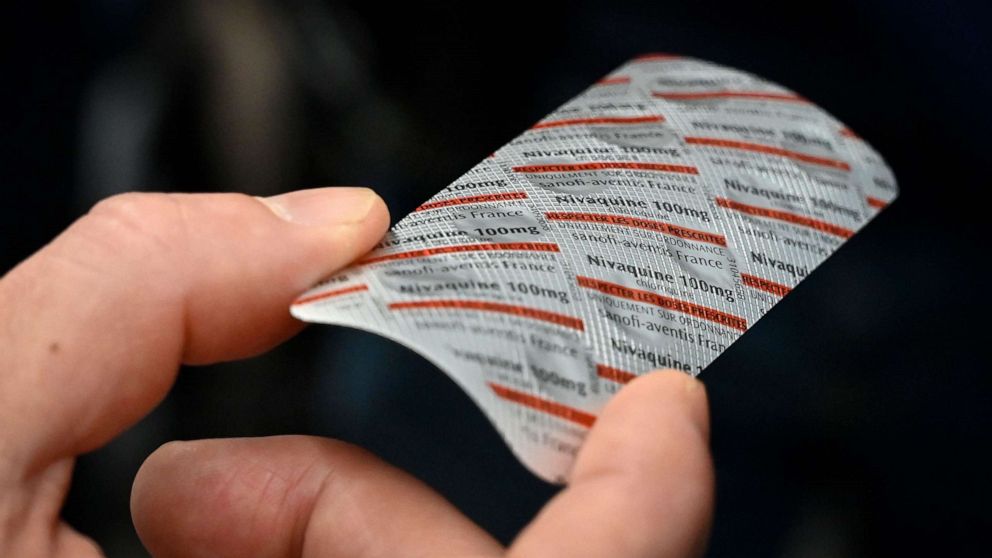Chloroquine, an old malaria drug, may help treat novel coronavirus, doctors say

What do malaria and COVID-19 have in common? On the surface, not much. But according to early research, an old malaria drug called chloroquine might also work for the new coronavirus.
Could a decades-old malaria drug work to treat COVID-19? Elon Musk seems to think so, recently tweeting that it “might be worth considering chloroquine” for COVID-19. Although data are spare, studies so far seem to back up the billionaire entrepreneur’s suggestion.
Chloroquine, or hydroxychloroquine, has been used to treat malaria since 1944. It can be given before exposure to malaria to prevent infection, and it can also be given as treatment afterward.
Malaria is a disease that is caused by a parasite, unlike COVID-19. Nevertheless, laboratory studies show chloroquine is effective at preventing as well as treating the virus that causes severe acute respiratory syndrome, or SARS, a close cousin of COVID-19.
Tune into ABC at 1 p.m. ET and ABC News Live at 4 p.m. ET every weekday for special coverage of the novel coronavirus with the full ABC News team, including the latest news, context and analysis.
Given chloroquine’s effectiveness in treating SARS, scientists have investigated if it will be an effective treatment against the new coronavirus responsible for COVID-19. So far, the initial trials are encouraging.
“There is evidence that chloroquine is effective when they looked at SARS in vitro with primate cells,” said Dr. Len Horovitz, a pulmonologist and internist at Lenox Hill Hospital in New York City. “The theory of the experiment with primate cells was that chloroquine could be for preventing viral infection or as a treatment for viral infection after it had occurred. In vitro in these primate cells, there was evidence that viral particles were significantly reduced when chloroquine was used.”
Both the virus that causes SARS and the virus responsible for COVID-19 belong to the same overarching family of coronaviruses. Researchers in China discovered that the protein spikes on the surface of the COVID-19 virus are similar to the protein spikes found on the surface of the SARS virus.
People become infected when those protein spikes bind to special receptors on the outside of human cells. Chloroquine works by interfering with those receptors, which may interfere with the virus’s ability to bind to cells.
“The way that it worked against SARS was by preventing of the attachment of the virus to the cells. Chloroquine interfered with the attachment to that receptor on the cell membrane surface,” Horovitz said. “So it’s disrupting a lock and key kind of mechanism of attachment.”
Researchers in China found that treating patients with COVID-19-associated pneumonia with chloroquine may shorten their hospital stay and improve the patient’s outcome.
There are more than 20 ongoing clinical trials in China and more scheduled to start in England, Thailand, South Korea and the United States.
LOG IN
Chloroquine, an old malaria drug, may help treat novel coronavirus, doctors say
Chloroquine, or hydroxychloroquine, has been used to treat malaria since 1944.
By
Dr. Angela N. Baldwin
19 March 2020, 18:36
8 min read
Inside the frantic race to find a drug to fight coronavirus
7:17
Inside the frantic race to find a drug to fight coronavirus
Scientists are testing whether existing FDA-approved drugs can fight novel coronavirus.
Gerard Julien/AFP via Getty Images
What do malaria and COVID-19 have in common? On the surface, not much. But according to early research, an old malaria drug called chloroquine might also work for the new coronavirus.
Could a decades-old malaria drug work to treat COVID-19? Elon Musk seems to think so, recently tweeting that it “might be worth considering chloroquine” for COVID-19. Although data are spare, studies so far seem to back up the billionaire entrepreneur’s suggestion.
MORE: Inside the frantic race to find a drug to fight coronavirus
Chloroquine, or hydroxychloroquine, has been used to treat malaria since 1944. It can be given before exposure to malaria to prevent infection, and it can also be given as treatment afterward.
Malaria is a disease that is caused by a parasite, unlike COVID-19. Nevertheless, laboratory studies show chloroquine is effective at preventing as well as treating the virus that causes severe acute respiratory syndrome, or SARS, a close cousin of COVID-19.
Tune into ABC at 1 p.m. ET and ABC News Live at 4 p.m. ET every weekday for special coverage of the novel coronavirus with the full ABC News team, including the latest news, context and analysis.
Given chloroquine’s effectiveness in treating SARS, scientists have investigated if it will be an effective treatment against the new coronavirus responsible for COVID-19. So far, the initial trials are encouraging.
“There is evidence that chloroquine is effective when they looked at SARS in vitro with primate cells,” said Dr. Len Horovitz, a pulmonologist and internist at Lenox Hill Hospital in New York City. “The theory of the experiment with primate cells was that chloroquine could be for preventing viral infection or as a treatment for viral infection after it had occurred. In vitro in these primate cells, there was evidence that viral particles were significantly reduced when chloroquine was used.”
Both the virus that causes SARS and the virus responsible for COVID-19 belong to the same overarching family of coronaviruses. Researchers in China discovered that the protein spikes on the surface of the COVID-19 virus are similar to the protein spikes found on the surface of the SARS virus.
Gerard Julien/AFP via Getty ImagesMedical staff shows on Feb. 26, 2020, at the IHU Mediterranee Infection Institute in… moreMedical staff shows on Feb. 26, 2020, at the IHU Mediterranee Infection Institute in Marseille, a packet of Nivaquine, containing chloroquine, a malaria drug that has shown signs of effectiveness against coronavirus, according to a study.
Gerard Julien/AFP via Getty Images
People become infected when those protein spikes bind to special receptors on the outside of human cells. Chloroquine works by interfering with those receptors, which may interfere with the virus’s ability to bind to cells.
“The way that it worked against SARS was by preventing of the attachment of the virus to the cells. Chloroquine interfered with the attachment to that receptor on the cell membrane surface,” Horovitz said. “So it’s disrupting a lock and key kind of mechanism of attachment.”
MORE: Simple answers to common questions about coronavirus
Researchers in China found that treating patients with COVID-19-associated pneumonia with chloroquine may shorten their hospital stay and improve the patient’s outcome.
There are more than 20 ongoing clinical trials in China and more scheduled to start in England, Thailand, South Korea and the United States.
Editor’s Picks
A woman uses hand sanitizer at Los Angeles International Airport, March 12, 2020, one day before a US flight travel ban hits 26 European countries amid ongoing precautions over the Coronavirus.
Social distancing is key to stopping coronavirus
How to properly sanitize your cellphone amid coronavirus outbreak
This handout illustration image taken with a scanning electron microscope shows SARS-CoV-2 (yellow)also known as 2019-nCoV, the virus that causes COVID-19isolated emerging from the surface of cells (blue/pink) cultured in the lab.
Coronavirus map: Tracking the spread in the US and around the world
Researchers are also exploring whether chloroquine could be used prophylactically — that is, to prevent infection before it occurs. It is particularly key “for healthcare workers that get sick,” noted Dr. Eric Cioe-Pena, director of Global Health at Northwell Health in New Hyde Park, New York. “Prophylaxis is a viable treatment option, at least in theory. It needs to be studied. It could be studied while in use. It is something we need to look at, and as terms of a candidate for preventing disease spread and severity.”
While the U.S. waits for the results of additional trials and FDA approval, researchers caution that doctors should only prescribe the drug for their patients under a special program that allows exceptions for experimental drugs during public health emergencies, under a framework set up by the World Health Organization.
“For the 85% of patients with mild to moderate symptoms that will go home, they don’t need this treatment and don’t want this treatment – it’s not valuable to them, it doesn’t offer any benefit,” said Dr. Cioe-Pena. “There could be minimal risk, but still risk. Risk of an allergic reaction is really a risk of a side effect, and they are going to get better anyway.”
Thankfully, the potential side effects of the drug are minimal.
“The principle side effects reported were headaches, gastrointestinal side effects like nausea, diarrhea and hair loss, primarily,” said Horovitz.
In addition, pharmaceutical company Bayer announced Thursday that it is donating 3 million tablets of the drug Resochin (chloroquine phosphate), a product discovered by the company in 1934 that is indicated for prevention and treatment of malaria, to the U.S. government.
Resochin also appears to have broad spectrum antiviral properties and effects on the body’s immune response, and new clinical research out of China shows potential for it to treat patients with COVID-19 infection, according to a statement from Bayer.
The drug is currently not approved for use in the U.S., but Bayer is working with the appropriate agencies on an Emergency Use Authorization.
More encouraging still is that there are several other promising drugs being studied, including the HIV anti-retroviral drug Kaletra (lopinavir/ritonavir) and the anti-Ebola medication remdesivir.
In the meantime we should each do our part by engaging in social distancing, self-quarantining and self-isolating when appropriate, to stop the spread of this pandemic.
Angela N. Baldwin, M.D., M.P.H., is a pathology resident at Montefiore Health System in the Bronx and a contributor to the ABC News Medical Unit



